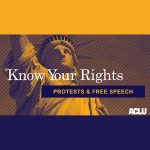The Georgetown Law Institute for Constitutional Advocacy and Protection published a fact sheet around the legality of “threats and incitement to violence related to the election” following the 2020 election. The following information was included:
- The First Amendment does not protect violent or unlawful conduct, even if the person engaging in it intends to express an idea.
- The First Amendment does not protect speech that includes imminent violence or lawlessness.
- Threats of violence, stalking, and harassing people, whether private individuals or public officials, are not protected by the First Amendment and may violate multiple federal and state criminal laws.
- It is a felony under federal law to communicate a threat to injure or kidnap another person online, by phone, or mail, or using other interstate channels.
- It is a felony under federal law to engage in stalking, defined as a course of conduct conducted online, through the mail, or traveling across state lines, which would put a person in reasonable fear of death or serious bodily injury or cause substantial emotional distress, when done with the intent to kill, injure, harass, intimidate, or surveil that person.
- State criminal laws penalize threats to injure or kill another person as well as stalking, which generally refers to a course of conduct that involves repeated harassment or threats that would cause a reasonable person to feel terrorized, frightened or intimidated.
- Crimes of violence intended to intimidate and coerce are considered terrorism under federal law, see18U.S.C. & 2331, and the laws of many states, and threats to commit such crimes are not protected by the First Amendment.




















